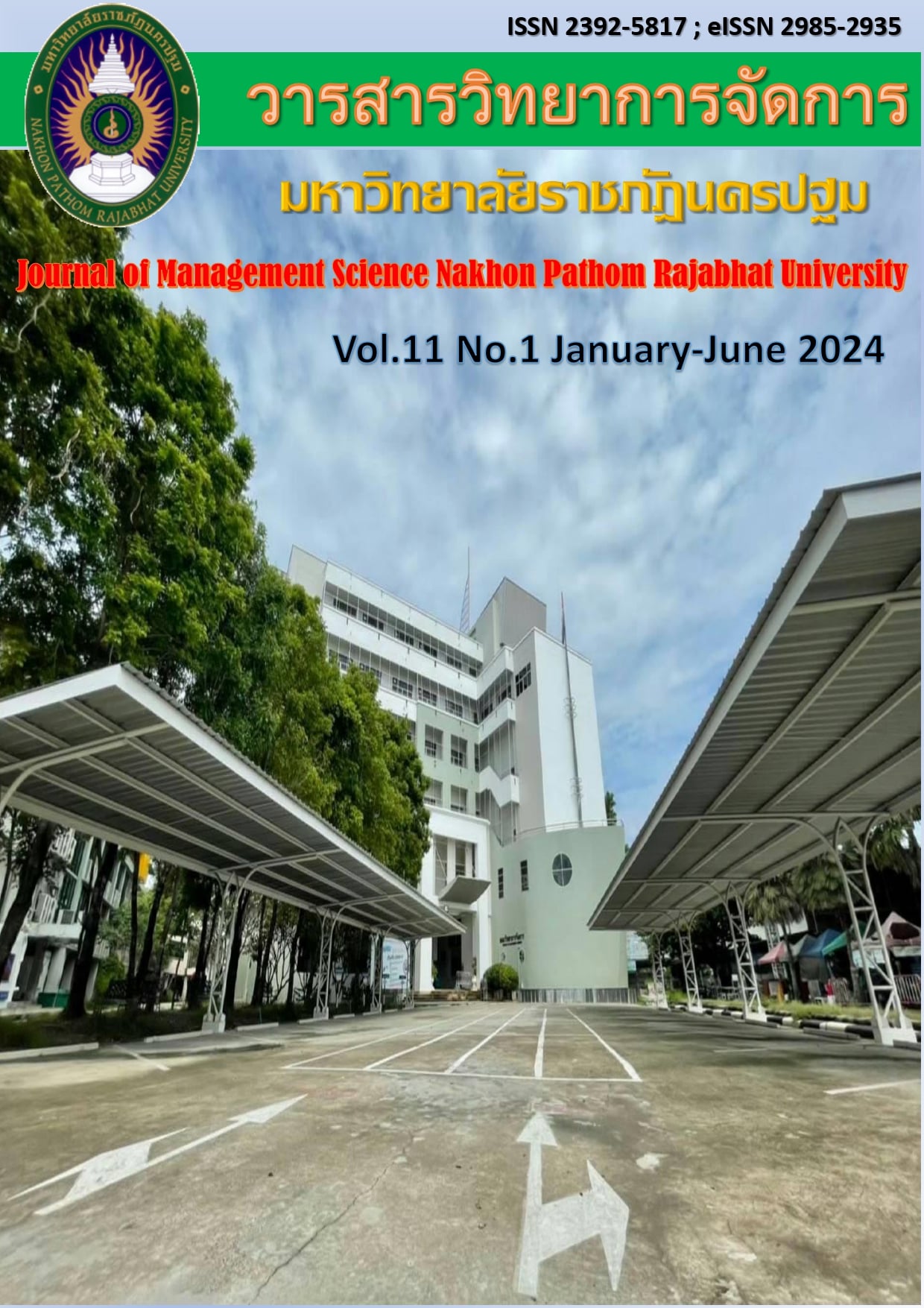Causal Factors of Affecting the Service, Satisfaction and Organizational Performance of the National Sports Development Fund, Thailand
Main Article Content
Abstract
Benefits from this research can be used explain the causal relationship and satisfaction result from service affecting the organizational performance of the National Sports Development Fund Thailand and the findings can be further applied as a guideline of management for sustainable organizational performance.
Article history: Received 2 January 2024
Revised 10 June 2024
Accepted 12 June 2024
SIMILARITY INDEX = 4.77 %
Article Details

This work is licensed under a Creative Commons Attribution-NonCommercial-NoDerivatives 4.0 International License.
The views and opinions of the article appearing in this journal are those of the author. It is not considered a view and responsibility of the editorial staff.
References
สำนักงานสภาพัฒนาการเศรษฐกิจและสังคมแห่งชาติ. (2565). ยุทธศาสตร์ชาติ 20 ปี พ.ศ. 2561-2580.[ออนไลน์]. ค้นเมื่อ 12 มกราคม 2565, จาก http://nscr.nesdc.go.th/ns/.
Anastasiei, B., & Dospinescu, N. (2019). Electronic Word-Of-Mouth for Online Retailers: Predictors of Volume and Valence. Sustainability,11(3), 814-832. https://doi.org/10.3390/su11030814
Augustus Dee Roberts. (2018). Factors that Influence Successful Organizational Change in Corporations: Examination of Change Management, Employees’ Reaction to Change and Change Outcomes. In Dissertation. University of Maryland University College.
Cronbach, L. J. (1984) . A research worker's treasure chest. Multivariate behavioral research, 19(2-3), 223-240.
Deelen, I., Ettema, D., & Kamphuis, B. M. (2018). Sports participation in sport clubs, gyms or public spaces: how users of different sports settings differ their motivations, goals and sports frequency. Public Library of Science Journal, 13(10), 12-24.
Fernando, Y., Jabbour, C. J. C., & Wah, W. X. (2019). Pursuing green growtin technology firms through the connections between environmental innovation and sustainable business performance: Does service capability matter. Resources Conservation and Recycling, 141, 8-20
Hair, J. F., Black, W. C., Babin, B. J., Anderson, R. E., & Tatham, R. L. (2006). Multivariate data Analysis. (6th ed.). Uppersaddle River: Pearson Prentice Hall.
Hair, J., Black, W. C., Babin, B. J., & Anderson, R. E. (2010). Multivariate data analysis Upper saddle River, New Jersey Pearson Education International.
Harimukti, W., Harm-Jan, S., & Aard, G. (2018). Exploring stakeholders’ support in International equity placement strategic alliance. Gadjah Mada International Journal of Business, 20(2), 205-228.
Hult, G. T. M., Sharma, P. N., Morgeson III, F. V., & Zhang, Y. (2019). Antecedents and
Consequences of Customer Satisfaction: Do They Differ Across Online and Offline Purchases. Journal of Retailing, 95(1), 10-23.
Jeongeun, S., Tae-Eung, S., & Hyun-Woo, P. (2018). A network analysis of strategic alliance
drivers in ICT open ecosystem: with focus on mobile, cloud computing and multimedia. Multimedia Tools and Application, 77(12), 14725-14745.
Kang, M. & You, J. W. (2014). The role of academic emotions in the relationship between
perceived academic control and self-regulated learning in online learning. Computers & Education, 77, 125–133.
Likert, R. (1967). The Human Organization: Its Management and Value. McGraw-Hill.
Ling, H. C., & Chao, C. (2019). The Quality of Service at Community Health Centers in
Taiwan. International Journal of Organizational Innovation, 12(1). 340-352.
Mendoza, E. C. (2021). A Study of Online Customers Repurchase Intention Using the 4Rs of Marketing Framework. International Review of Management and Marketing,11(2), 1-10.
Mehta, C., & Gupta, P. (2014). Sculpting Future Leaders: An Intrapreneurial Approach. Global Journal of Finance and Management, 6(4), 313-320.
Nikolaou, I. E., Tsalis, T. A. & Evangelinos, K. I. (2019). A framework to measure corporate sustainability performance: A strong sustainability-based view of firm. Sustainable Production and Consumption, 18, 1-18.
Olvera, J et al. (2017). Transformational Leadership and horizontal trust as antecedents of team performance in the healthcarecontext. Anales De Psicologia, 33(2), 356-375.
Pallant, J. (2010). SPSS survival manual: A step by step guide to data analysis using SPSS. Maidenhead. Open University Press/McGraw-Hill.
Prompong, J. (2015). Factors Affecting Customer Satisfaction at Suvarnabhumi Airport, Bangkok. Faculty of Commerce and Accountancy Thammasat University.
Quan, N., Chi, N., Nhung, D., Ngan, N., & Phong, L. (2020). The Influence of Website Brand
Equity, E-Brand Experience on E-Loyalty: The Mediating Role of E-Satisfaction. Management Science Letters, 10(1), 63-76.
Rubin, A. (2012). Statistics for evidence-based practice and evaluation. US: Cengage Learning.
Salunke, S., Weerawardena, J., & McColl-Kennedy, J. R. (2019). The central role of knowledge integration capability in service innovation-based competitive strategy. Industrial Marketing Management, 76, 144-156.
Shankar, A., Jebarajakirthy, C., & Ashaduzzaman, M. (2020). How Do Electronic Word of Mouth
Practices Contribute to Mobile Banking Adoption. Journal of Retailing and Consumer Services, 52, 101920. doi.org/10.1016/j.jretconser.2019.101920
Theodorakopoulos, N., & Budhwar, P. (2015). Guest Editors' Introduction: Diversity and Inclusion in Different Work Settings: Emerging Patterns, Challenges, and Research Agenda. Human Resource Management, 54(2), 177-197. doi:10.1002/hrm.21715
Ziyae, B. (2016). Presenting an evaluation model of human resource management's effect on corporate entrepreneurship. World Journal of Entrepreneurship, Management and Sustainable Development, 12(3), 228-242.

